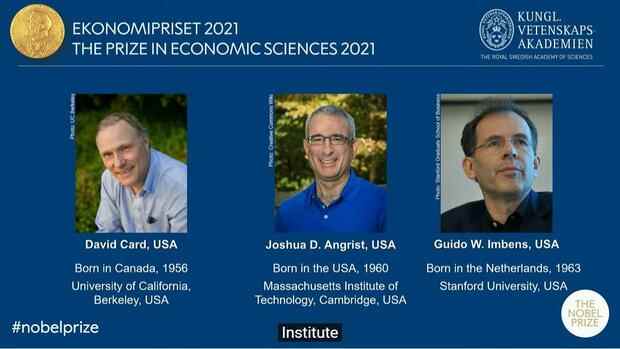The Royal Swedish Academy of Sciences honors the three researchers David Card, Joshua D. Angrist and Guido W. Imbens.
Stockholm This year’s Nobel Prize in Economics goes to three researchers. David Card, Joshua D. Angrist and Guido W. Imbens will be honored, as the Royal Swedish Academy of Sciences in Stockholm announced on Monday.
The Canadian Card from the University of California at Berkeley received half the price for “its empirical contributions to labor economics”. The American Joshua D. Angrist from the Massachusetts Institute of Technology in Cambridge and the Dutchman Guido W. Imbens from Stanford University share the second half “for their methodological contributions to the analysis of causal relationships”.
All three researchers “provided us with new knowledge about the labor market and showed what conclusions can be drawn about cause and effect from natural experiments,” the academy justified its decision. “Your approach has spilled over into other areas and revolutionized empirical research.”
Many of the big questions in the social sciences have to do with cause and effect – such as how immigration affects wages and employment levels. These questions are difficult to answer because there are no comparisons. “We don’t know what would have happened if there had been less immigration,” says the academy. However, this year’s award winners have shown that it is possible to answer these and similar questions with natural experiments.
Top jobs of the day
Find the best jobs now and
be notified by email.
You can find the detailed justification of the jury in the following video:
The Nobel Prize in Economics has been awarded since 1968. It is donated by the Swedish central bank and is endowed with ten million kroner (around 960,000 euros).
US scientists Paul Milgrom and Robert Wilson received the award last year. Both conduct research in the field of so-called auction theory
The Nobel Prize for Economics, which has been awarded since the late 1960s, is the only one that does not go back to the will of the prize sponsor and dynamite inventor Alfred Nobel (1833-1896). It was donated by the Swedish Central Bank and is therefore not, strictly speaking, a classic Nobel Prize. Nevertheless, it will be presented together with the other prizes on the anniversary of Nobel’s death, December 10th.
So far, only one German has been among the Nobel laureates in economics: the Bonn scientist Reinhard Selten received it in 1994 together with John Nash and John Harsanyi for their groundbreaking contributions to non-cooperative game theory.
According to tradition, scientists from the USA are among the favorites for the award. Last year it went to the US economists Paul R. Milgrom and Robert B. Wilson, who were honored for their improvements in auction theory and the invention of new auction formats.
The Nobel Prize winners in the categories of medicine, physics, chemistry, literature and peace had already been announced last week. Among the chosen were two Germans, the meteorologist Klaus Hasselmann in physics and the chemist Benjamin List.
More: Nobel Peace Prize for journalists Maria Ressa and Dmitri Muratow
